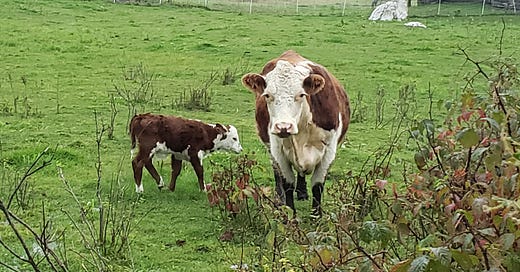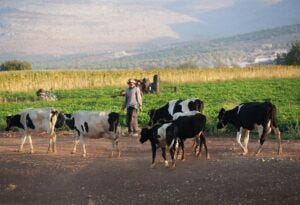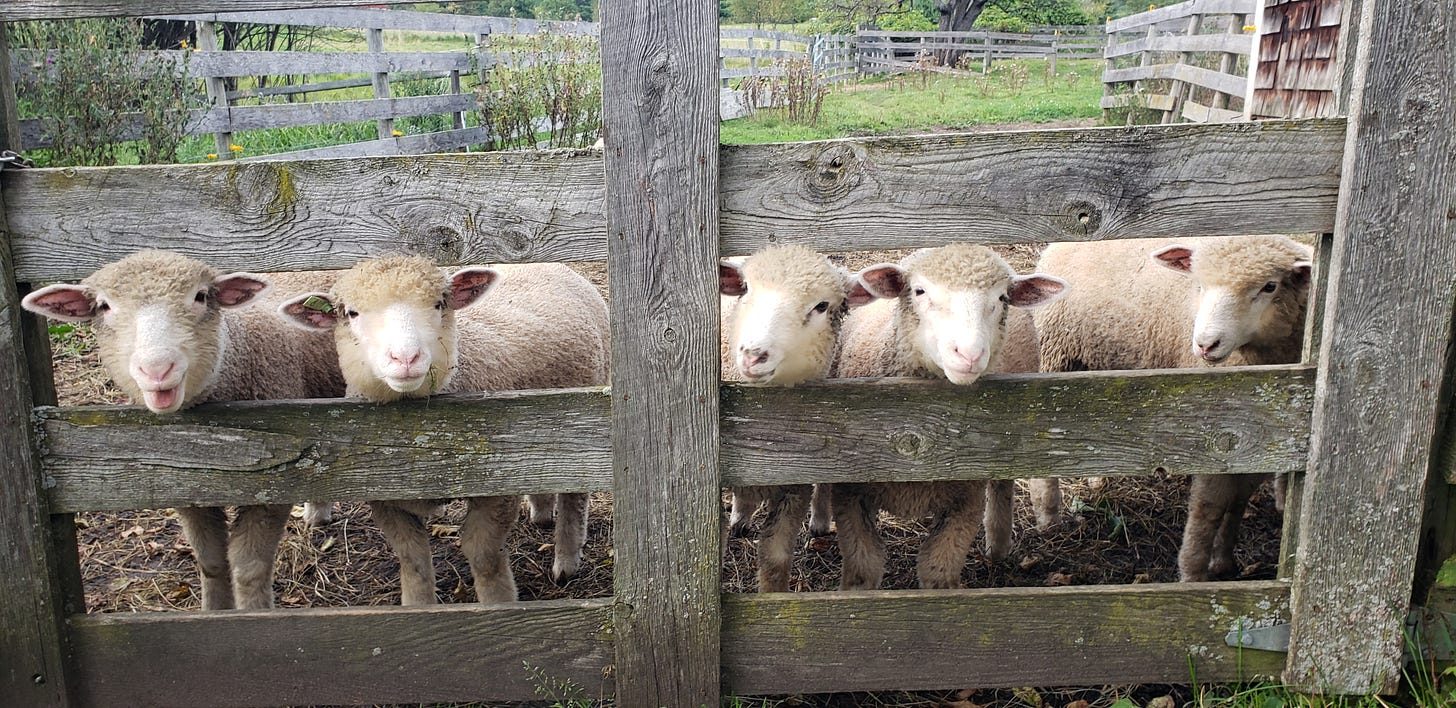California and other states (and many nations) have enacted laws to regulate “ethical” treatment of animals in agriculture. This trend accompanies modern jurisprudence shielding domestic pets and criminalizing animal cruelty. Advocates for animal welfare legislation, such as PETA, invoke claims of “animal rights” — but these same groups call for boycotts on products made from these animals
(Our newest addition — only, PETA and others would counsel I not breed my cows but allow them all to expire.)
To erase meat, milk, bacon, leather, and honey from human use is to eliminate (rather than ethically regulate) the animal husbandry that gives life to these creatures. This is a strange way to address the “rights” of these animals — raising questions not about the morality of farmers, who mostly strive to take good care of their livestock, but of the moral reasoning of animal rights activists.
Animal Thinking
There is a philosophical question about animal awareness implicit in this debate. How, for instance, do humans know that dolphins are not chatting at some very high level of communication? Border collies easily learn hundreds of words, as do crows. Are animals aware of death and suffering, and does that awareness impact the view of their “rights”?
PETA sidesteps this question with accustomed irony, appealing to end the existence of animals by exploiting not merely claimed but often nonexistent suffering and assertions of cognate awareness. Says PETA: “We believe that every creature with a will to live has a right to live free from pain and suffering.”
It is bizarre that PETA would assign a right “to live free from pain and suffering” to creatures only “with a will to live.” What of the animals PETA wants to put forever out of a job by eliminating the industries of which they are the core, or the dogs and cats PETA so efficiently euthanizes humanely – do they not have “a will to live”? A similar circular argument is heard by abortion proponents who assert that “terminated” babies are spared a life of hardship. But don’t they have as much will to live as a cow in a field, or a sow suckling her shoats in the shade?
Ayn Rand argued that ethical treatment of others – including animals – depended on awareness of life and death and the values that arise from that consciousness. The Atlas Society (named for Rand’s classic Atlas Shrugged) related:
“As Ayn Rand argued, value depends on the existence of a being that faces the alternative of continued existence or the end of existence — and a being that must act to continue in existence. Values, then, are those things that are required for the being’s continued life. Therefore, a value is always a value for some reason (it is required for life) and to some organism (the being acting in the face of the alternative of life or death) … Humans are the only organisms that are capable of volitional rationality and, as such, are the only organisms capable of morality. And while animals certainly face the alternative of life or death and thus pursue value, they do not react to this alternative by choosing what actions to take and what values to pursue to maintain their lives. They do not and cannot pursue moral values.”
Bovine Philosophizing?
(Photo by Rami Alsayed/NurPhoto via Getty Images)
This is visible in cows, who spend most of their lives seeking forage, then gacking up cud to masticate while contemplating the view. What are they thinking?
As ruminants, bovines have four stomach chambers. When they are not churning green gunk around in their bellies and chomping mouths (while multi-tasking with manure distribution and methane flatulence/burpation), they are likely taking a snooze. But what are they thinking?
Cows are not contemplating their endless struggle against that dark night we humans see as death. Cows will look past the electric or barbed-wire fence for greener pastures but don’t dream of a pastoral afterlife on the other side of their own mortality. They don’t even look past one meal to the next, or even past chew to chew.
Animal Souls
C.S. Lewis pondered the idea of animal spirituality in his tome The Problem of Pain, suggesting domesticated animals might accompany humans to heaven. G.K. Chesterton dodged the issue – in accustomed fashion – by hitting it straight and bluntly head-on:
“Mr. G.K. Chesterton after stating frankly that the subject is one of the many questions on which he is content to be an agnostic, says: – ‘About one thing I am quite clear, that it is perfectly right that the two ideas of the immortal man and the immortal mongoose should be treated as quite distinct. The second is simply a speculation about the mystery of nature that lies around us; the first is a practical question affecting the common conscience of a man and the consequences of his own action.’”
Some Closing Ruminations on Ruminants
A cud-grinding heifer may see her image in a window and reflect on her rumination – perhaps ruminating upon her reflection. We will never know, but we know she is alive. She is also tended by a human steward without whom she would quickly perish with assured pain and suffering. Unaware, the heifer is not a slave to the human, nor is the human slaving away to maintain water, food, healthcare, clean bedding, and sanitation for her bovine charges a slave to her cows. It is a symbiosis, ancient and bountiful.
PETA and its army of anarchic animal activists speculate about the mystery of the rights and consciousness of dolphins, cows, and coyotes. But a rational being would ask how killing creatures – man or beast – in the name of being humane is humane. Only humans are asking this question, which much concerns “the common conscience of a man and the consequences of his own action.”
(Previously published at Liberty Nation.)








Thank you John for expressing what is inside of my thought process. Ethics, from a human standpoint, is in the mind of the beholder. After traveling to India many years ago, the cow is treated as sacred and yet the people (poor) would not hesitate to kill a dog for food. That's something that would not be tolerated in this country. The ideas of PETA have merit but as with most organizations, they go too far. As I travel around Vermont in my day to day activities, I love to look at the majesty of the cows and steers in the field. They have a purpose existing and we as humans do have a symbiotic relationship with them. The problem is with those that have a viewpoint, that does not tolerate any other viewpoints (our world condition today). Who's is to say that we as humans, are not fodder for other forms of creation that we are not aware of. Maybe that is our plight to evolve from and it is evident in our world condition today! Many people don't critically think, they just just express their own viewpoint as being gospel. I love the cow and I do consume them and their products. Respect for their existence and treatment of their demise is tantamount.......
Brilliant piece. The reality is that cattle would not even exist if man did not use them as nourishment.